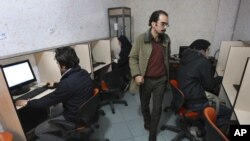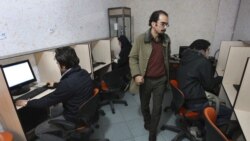The murder of Iranian blogger Sattar Beheshti in Evin prison earlier this month, who reportedly died after a brutal beating by authorities, is a horrific example of the Iranian regime’s war on free expression.
The numerous deaths in detention of other dissident students, scholars, and journalists are also evidence of such a war. So are the closing of newspapers and magazines by the government; the massive blocking of internet sites; the establishment of cyber police to patrol Iranian citizens’ activity on the internet; and the jamming of international satellite broadcasts.
Eileen Chamberlain Donahoe, the U.S. Representative to the United Nations Human Rights Council, said in an interview that Iran is becoming “an increasingly closed society:”
“The brutality and cruelty of the Iranian authorities mean that the voices of the citizenship are not getting out and that they’re being intimidated from speaking. And, at the end of the day, if you do not allow for free speech, freedom to assemble, associate, use the internet without constraint, it means that the entire human rights situation becomes worse, because the government knows it can get away with things without scrutiny.”
The United States recently imposed new sanctions on several Iranian entities and individuals, including Minister of Communication and Information Technology Reza Taghipour, for their crackdown on and censorship of the Iranian people.
These measures, said State Department Spokesperson Victoria Nuland, “draw the world’s attention to the scope of the regime’s insidious actions. . .We will continue to stand with the Iranian people in their quest to protect their dignity and freedoms.”
The numerous deaths in detention of other dissident students, scholars, and journalists are also evidence of such a war. So are the closing of newspapers and magazines by the government; the massive blocking of internet sites; the establishment of cyber police to patrol Iranian citizens’ activity on the internet; and the jamming of international satellite broadcasts.
Eileen Chamberlain Donahoe, the U.S. Representative to the United Nations Human Rights Council, said in an interview that Iran is becoming “an increasingly closed society:”
“The brutality and cruelty of the Iranian authorities mean that the voices of the citizenship are not getting out and that they’re being intimidated from speaking. And, at the end of the day, if you do not allow for free speech, freedom to assemble, associate, use the internet without constraint, it means that the entire human rights situation becomes worse, because the government knows it can get away with things without scrutiny.”
The United States recently imposed new sanctions on several Iranian entities and individuals, including Minister of Communication and Information Technology Reza Taghipour, for their crackdown on and censorship of the Iranian people.
These measures, said State Department Spokesperson Victoria Nuland, “draw the world’s attention to the scope of the regime’s insidious actions. . .We will continue to stand with the Iranian people in their quest to protect their dignity and freedoms.”






